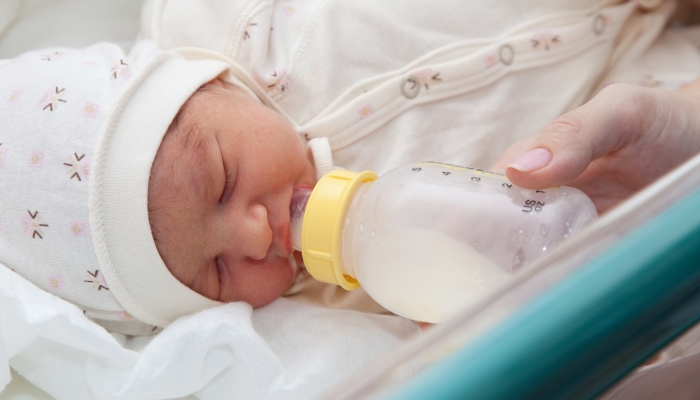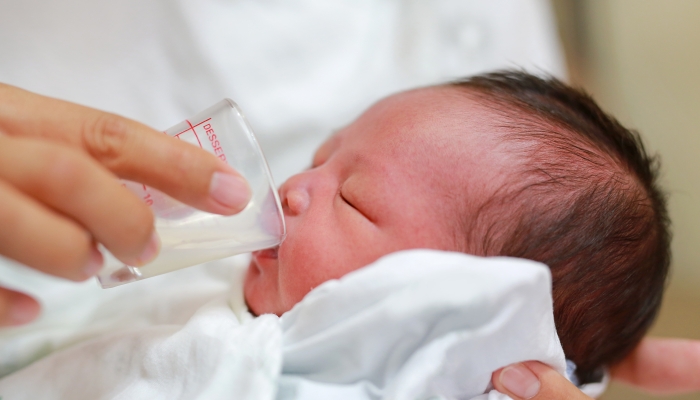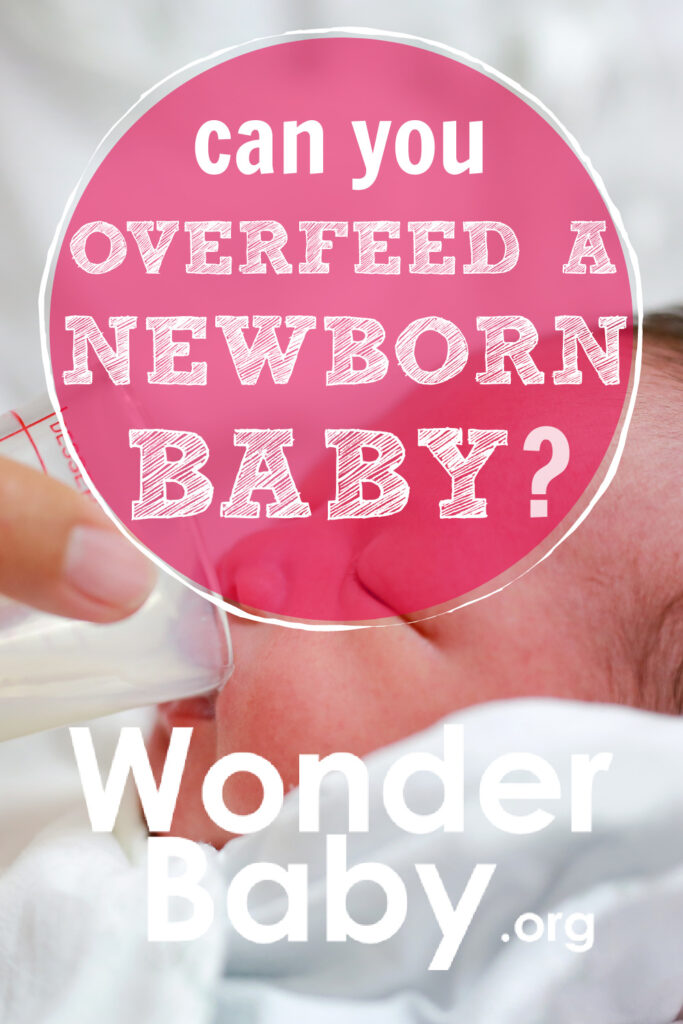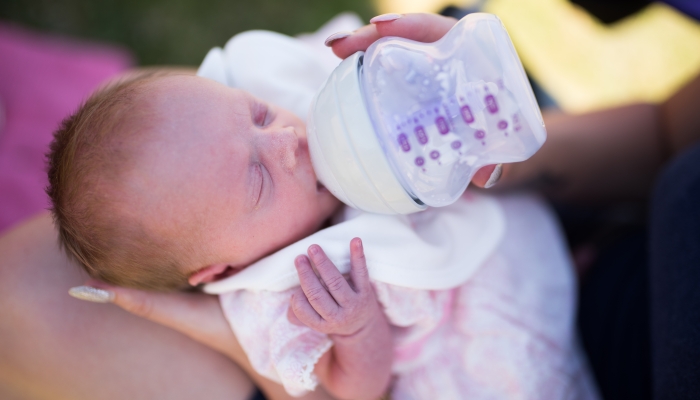Can You Overfeed a Newborn Baby?

- Newborn babies are usually very good at self-regulation.
- Overfeeding a newborn is rare, but it can happen.
- Signs of overfeeding a baby can include excessive spit-up, gas, or loose stool.
- You do not need to feed your newborn baby every time they cry.
Many new parents worry about their new baby getting enough milk. Mothers who breastfeed tend to get especially worried about producing enough milk for their little ones since it’s difficult to measure exactly how much their baby is getting.
Many parents learn about hunger cues and watching for wet diapers and weight gain to determine whether their baby is getting enough milk. Parents are more likely to worry about their child getting too little rather than too much milk.
On the other hand, if your baby is spitting up excessively or seems uncomfortable after a feeding, you might start to wonder if you can overfeed a newborn baby. Although overfeeding isn’t common in newborns, it can happen sometimes.
How Much Should Newborns Be Fed?
Most of the time, a healthy baby will eat when they are hungry and stop when they are full. Typically, both bottle-fed babies and breastfed babies need to eat 8 to 12 times per day. As your baby gets older, they will be able to eat less often, but take in more milk with each feeding.
Most babies’ needs change as they age. Here’s what you can expect:
| Age | Ounces per feeding | Frequency |
| Newborn | 2-3 oz | Every 2-3 hours |
| 1-3 months | 4-5 oz | 8 times per day |
| 3-6 months | 5-8 oz | 6 times per day |
| 6-9 months | 6-8 oz | 4-5 times per day |
| 9-12 months | 7-8 oz | 4 times per day |
How to Tell If a Newborn Is Full

Newborns who are full may take longer pauses between drinks or turn away from the breast or bottle. Newborns and infants usually stop drinking breast milk or formula when they’re full.
Can You Overfeed a Newborn Baby?
Usually, babies are very good at regulating their own eating. However, there are some infant and parent behaviors that may contribute to feeding problems. While uncommon, it is possible to overfeed a baby.
Some parents end up overfeeding a baby because they offer a bottle or breastmilk every time the baby is crying. Since many newborns are comforted by sucking, they may accept the bottle or breast even if they are not hungry.
If you have a colicky baby, it’s especially important to avoid overfeeding. An overfed baby may become fussier than usual, creating a vicious cycle of feeding for comfort and worsening stomach pain.
How to Tell if a Newborn Is Overfed
Even infants who are good at self-regulating may have days where they eat too much. There are a few signs of overfeeding you can watch for if you’re worried about your baby. These include:
- Excessive spit-up
- Refusing the breast or bottle
- Fussiness
- Excessive gas
- Loose stools
As long as your baby is gaining weight appropriately, has good muscle tone, and seems happy and content after a feeding, they are probably getting just the right amount of breastmilk or formula during each feeding session.
Helpful Tips to Avoid Overfeeding a Newborn Baby

1. Let your baby decide how much milk they need.
While guidelines about how much a baby should drink each day are helpful, you shouldn’t force your child to finish a bottle feeding just to meet a certain number of ounces each day. It’s perfectly normal for a healthy baby to eat more on some days and less on others.
2. Comfort your baby with non-food items.
It’s easy to reach for a bottle or offer breast milk to a baby when they’re crying. However, babies cry for all kinds of reasons including upset stomach, being too hot or too cold, wanting to be held or rocked, being afraid, or being unable to communicate their needs. Try to comfort your baby using non-food items before jumping right to milk as a solution.
3. Learn your baby’s hunger cues.
Crying is actually a late sign of hunger in babies. Hunger cues in infants include moving their fist to their mouth, head turning to look for a bottle or breast, acting more alert or moving around more, sucking on hands, and opening and closing their mouth.
4. Avoid distractions while feeding your baby.
Just like adults, distractions during a feeding session may lead to an overfeeding baby. If you are giving your child a bottle or breastfeeding while watching television or playing on your phone, you may miss signs that they’re full. In addition, distracted babies may overeat and end up with an upset stomach.

FAQs
What should you do if your baby spits up during feeding?
If your baby spits up during a feeding, let them take a break for a few minutes before you try to give their bottle back or start breastfeeding again. It’s also a good idea to burp your baby to see if they have any air stuck in their belly.
If they turn towards the bottle or breast and immediately start feeding again, they’re probably still hungry. If they turn away, it’s okay to end the feeding session.
Should newborns be fed every time they cry?
A newborn baby doesn’t need to be fed every time they cry. In fact, feeding a baby every time they cry is one of the most common causes of overfeeding a baby. If they’re crying, see if your baby responds to being held or rocked, needs a diaper change, or is too hot or cold.
Can overfeeding my newborn lead to obesity later in life?
While it’s rare for overfeeding to cause obesity in infants and children, obesity in children can increase the chances of a child struggling with their weight later in life. Make sure to talk to your pediatrician if you’re worried about your child’s weight. Restricting calories is not recommended for children under 2 years old, regardless of their weight.
Can I use a pacifier to help prevent overfeeding?
Overfeeding a baby may be prevented by offering a pacifier instead of a breast or bottle. If you are using breast milk or bottle feeding to soothe your baby every time they cry, you might want to try a pacifier instead.
References
- Jay L. Hoecker, Baby Fat: When is it cause for concern? Mayo Clinic. https://www.mayoclinic.org/healthy-lifestyle/infant-and-toddler-health/expert-answers/baby-fat/faq-20058296. Published October 1, 2022. Accessed May 3, 2023.
- Mayo Clinic Staff. Colic. https://www.mayoclinic.org/diseases-conditions/colic/symptoms-causes/syc-20371074. Mayo Clinic. Accessed May 3, 2023.
- Mayo Clinic Staff. Feeding Your Newborn: Tips for New Parents. Mayo Clinic. https://www.mayoclinic.org/healthy-lifestyle/infant-and-toddler-health/in-depth/healthy-baby/art-20047741. Accessed May 3, 2023.
- US Department of Agriculture. Baby’s Hunger Cues. https://wicbreastfeeding.fns.usda.gov/babys-hunger-cues. Accessed May 3, 2023.

The information WonderBaby provides is not intended to be, and does not constitute, medical or other health advice or diagnosis and should not be used as such. Always consult with a qualified medical professional about your specific circumstances.
Related Posts

Feeding and Eating, Special Needs
Feeding Therapy Approaches for Infants with Special Needs
Many children with special needs have feeding difficulties. Working with a speech therapist, being patient, and experimenting with textures can help.

Feeding and Eating
Unexpected Foods That Cause Allergen Cross-Reactivity
A variety of unexpected foods and environmental substances can trigger an allergic reaction through cross-reactivity to food proteins.

Feeding and Eating
Easing Anxiety for Families Facing Food Allergies
Ongoing physical preparations and speaking openly about anxiety can ease the transition from diagnosis to living well with a food allergy.